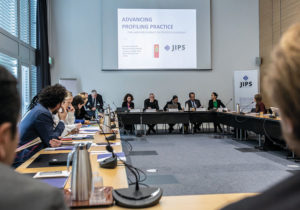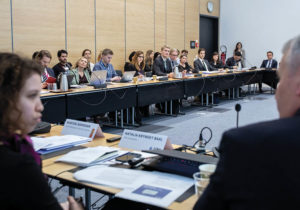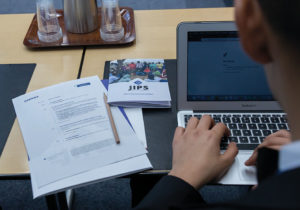Internal displacement situations are diverse, challenging, complex and often evolving over time. As the Danish Ambassador Morten Jespersen noted in his opening remarks to JIPS’ 2019 annual event, there are no quick fixes and humanitarian responses alone will not fully address the phenomenon. One thing that is certainly needed is quality data for sound strategic and programmatic decision-making.
Recognising the growing significance and increased scrutiny within the sector on data, Ambassador Jespersen pointed towards the need for our joint efforts to improve standards, capacity and practice in this regard. Accordingly, this year’s JIPS annual event was dedicated to the topic of advancing profiling practice for improved evidence on forced displacement, in order to contribute to this discussion within the wider humanitarian and development community.
Co-chaired by the Permanent Mission of Denmark to the UN in Geneva, and held on the side-lines of the 2019 Humanitarian Networks and Partnerships Week (HNPW), the event included an expert panel composed of Cecilia Jimenez-Damary (Special Rapporteur on the human rights of IDPs), Filiep Decorte (Deputy Director, UN-Habitat New York), Ramesh Rajasingham (Director of the Coordination Division, OCHA), and Bina Desai (Head of the Policy and Research Department, IDMC) to discuss progress made in key areas to explore new approaches, including:
Natalia Baal, JIPS’ Coordinator, also took the opportunity to share achievements in relation to our three strategic goals one year into the implementation of our strategy 2018-2020, and to receive input from participants to further shape our plans for the year ahead. The article hereafter zooms in on the panel discussion. However, if you’re interested in reading more about our highlights from 2018 and our plans for 2019, please check out Natalia’s presentation available here.

The full panel at JIPS’ 2019 annual event, from left to right: Filiep Decorte (standing; UN-Habitat), Natalia Baal (JIPS), Danish Ambassador Morten Jespersen, Special Rapporteur Cecilia Jimenez-Damary, Ramesh Rajasingham (OCHA) and Bina Desai (IDMC).
This was reinstated by many high-level initiatives and policy processes in recent years, not least the Global Compact on Refugees, the Global Compact on Safe, Orderly and Regular Migration, the recent World Data Forum, but also the soon-to-come OECD DAC guidelines. As Ambassador Jespersen pointed out in his opening remarks:
“Good data matters in both refugee and IDP contexts as a solid evidence base is the prerequisite for […] bridging the humanitarian-development-peace nexus and to create more coherent, joined-up and long-term programming with the overall focus of leaving no one behind.”
Denmark, the Ambassador further emphasised, has made a strong commitment in this regard, including their long-term support to JIPS, in addition to other initiatives including UNHCR’s Data Service, the Mixed Migration Centre, and the newly established World Bank – UNHCR Joint Data Centre.
He encouraged like-minded donors to join in support for JIPS’ work and welcomed JIPS’ contribution, in particular mentioning that “the work of the inter-agency technical support service which enjoys high credibility due to its professional and collaborative nature is paramount”. This is showcased, among others, in the following four areas of JIPS’ exploratory work:
IDPs and their host communities are not “mere recipients of humanitarian and development aid”. For Cecilia Jimenez-Damary, “[affected communities] have a fundamental role to play in understanding and effectively responding to displacement contexts”, and this is a priority topic of both the mandate and the Plan of Action marking 20 years of the Guiding Principles on Internal Displacement (GP20).
Drawing on experiences from JIPS’ work, Cecilia Jimenez-Damary highlighted the benefits of proactively involving IDPs and their host communities in profiling: from tailored data obtained with the help of IDPs in Sudan to set priorities in the early stages of the exercise, to the advantages of consulting communities at the dissemination stage of profiling, as was done in Myanmar. In particular, on the anniversary of the Convention of the Rights of the Child, she highlighted the importance of community engagement with children and youth, which can enhance analysis and improve targeted programming, citing the case of Honduras as an example.
“If we are to ensure that our commitments to making evidence-informed decisions are translated into concrete measures, including the voices of IDPs as effectively as possible in shaping data collection and analysis is fundamental.”
Community engagement in profiling does not come without its challenges, most notably securing time and resources for it, as well as overcoming the socio-political “resistance” that sometimes accompanies this process. As the Special Rapporteur pointed out, it is important that these efforts continue to receive support.

“Urban profiling is a necessity”: for Filiep Decorte, to better understand the impact of displacement on cities and how to best respond to urban displacement situations, we need to connect analysis of “place” with that of “people”. This requires a specific skill set and a different kind of data than is often available. In addition, it calls for a joint effort of not only humanitarian and development actors, but also local authorities, built environment professionals and affected communities.
We have already come a long way towards improving practice, and the just-released knowledge product “Urban Profiling for Better Responses to Humanitarian Crises”, developed through the Global Alliance for Urban Crises, is just the most recent example. Filiep Decorte saw three main areas where improvement was needed:
Citing the Global Alliance for Urban Crises’ charter and its emphasis on establishing partnerships among local, regional and global partners, Filiep Decorte concluded by highlighting UN-Habitat’s commitment to strengthening their partnership with JIPS and introducing plans to establish a platform in Geneva to consolidate learning and advocacy for urban crisis response.
As reiterated by Ramesh Rajasingham, agreed-upon data obtained through joint analysis is key to an effective, adequate, and timely response in a crisis context. Efforts to make implementation of collaborative data analysis more systematic are already underway as part of efforts under the Grand Bargain’s needs assessment workstream, co-led by OCHA and the European Commission’s Humanitarian Aid (ECHO), including:
Citing the example of the profiling exercise in El Fasher, Sudan, aimed to inform the local durable solutions strategy, he highlighted the added value of JIPS’ role in bringing together local and national authorities with international organisations, identifying their common information needs through joint analysis.
“We must move beyond technical, analytical tools and approaches to thinking through the process management and softer skills required to do the job well.”
Through field support delivery and investment in strategic capacity building, JIPS intends to contribute to this work this year.

Pointing back to Ambassador Jespersen’s opening remarks that there are now twice as many IDPs around the world than there are refugees, Bina Desai took to her presentation by underlining:
“Durable solutions are at the core of what we need to get at, not just for IDPs and returning refugees, but also for the societies and economies in which they experience their displacement.”
Displacement impacts a number of issues which are at the heart of interest of governments, including a country’s socio-economic development and security situation. She highlighted key findings from IDMC’s ongoing work on the economic impact of internal displacement and also argued for the importance of efforts to “integrate concerns for displacement in national planning […] and make durable solutions a central part of conversations [with development actors]”.
The Durable Solution Indicator Library provided a useful starting point for IDMC’s own global data analysis efforts to better understand this multidimensional impact of displacement on the ground.
Moving beyond the indicator library and analysis guidance, Bina Desai welcomed ongoing efforts to develop a measure to statistically define the end of displacement. This is currently being worked on by the Expert Group on Refugee and IDP Statistics, in which JIPS has been heavily invested since its initiation in 2016 and now as lead of the IDP subgroup, and which also counts on strong participation from national statistical offices in addition to international experts including IDMC, UNHCR, IOM, OCHA and the World Bank.
During the subsequent discussion a number of relevant points were also raised:
We will continue our work in each of the above-discussed areas – community engagement, urban profiling, collaborative data analysis, and measuring durable solutions – to help overcome the persistent challenges that arise in situations of forced displacement and to inform more effective, evidence-based and joined up responses.
—